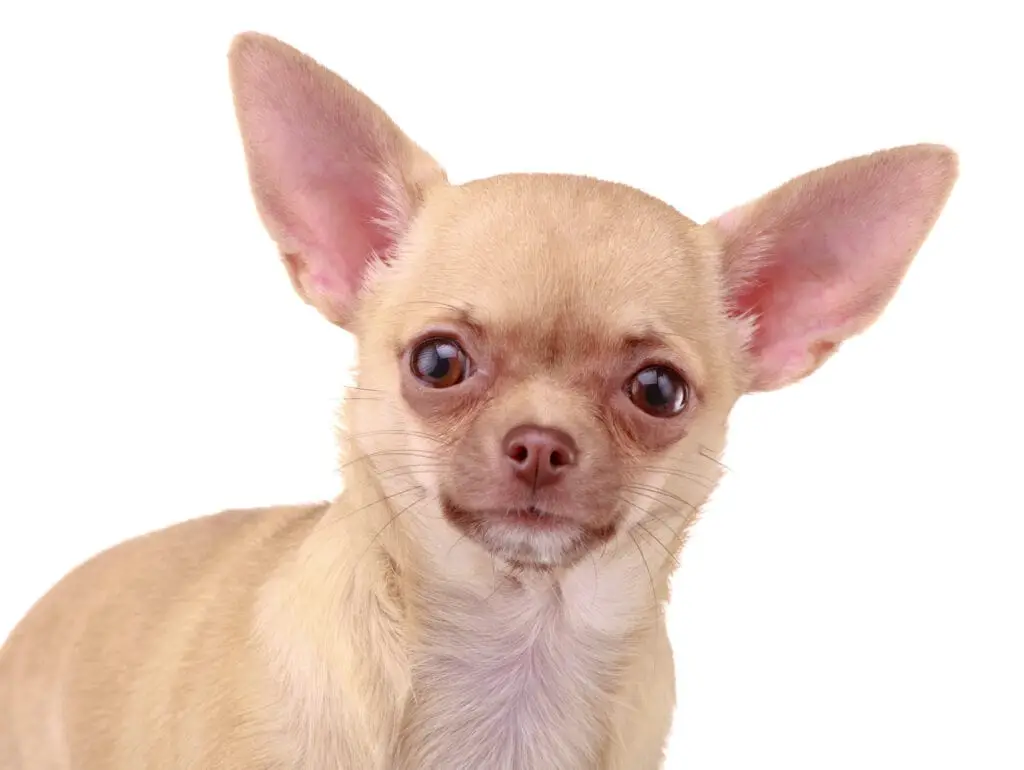Our website is supported by our users. We sometimes earn money when you click an affiliate link and make a purchase. This is at no extra cost to you and helps us to create quality content. For all that have shown us such wonderful support, we thank you from the bottom of our hearts!
Chihuahuas are a fascinating and popular breed of toy dogs that originated from Mexico. Known for their big personalities and tiny size, these charming companions have captivated the hearts of dog enthusiasts from around the world.
The Chihuahua not only makes a lively and affectionate companion but also is a proud member of the toy group in the American Kennel Club.

As you learn about this small but mighty dog breed, you’ll discover that Chis (Pronounced “cheese’) come in two coat types: smooth and long hair.
These tiny dogs can be found in various colors and patterns, making them a diverse breed when it comes to appearance.
One important point to remember is their unique, large, rounded skull known as an apple head, which, along with their saucy expression and erect ears, gives Chis their distinct appearance.
When it comes to temperament, Chis are known for their energetic and terrier-like attitude.
They may be small in size, but they’re certainly not short on confidence! To ensure that your Chihuahua grows into a well-adjusted adult, it’s essential to give them proper training, socialization, and care.
This includes paying special attention to their grooming and exercise needs, as well as monitoring their health due to the breed’s unique genetic signature and susceptibility to certain health issues.
Related article:
Chihuahua Poodle Mix: Facts on the Chi-Poo Dog Breed
History of Chihuahuas
The Chihuahua, a small dog breed with a big personality, has its origins in the ancient Mexican civilization.
It is believed that this breed descended from the Techichi, a small mute dog kept by the Toltec people of Mexico as far back as the 9th century CE. Although these dogs were already quite small, they were larger than the modern Chis that we know today.
Over time, Chis have been associated with various roles in the ancient Americas. Some of the main functions of their ancestors included:
- Companionship
- Religious ceremonies
- Rituals
- Being a source of food
The breed gets its name from the Mexican state of Chihuahua, where it was first discovered in the mid-19th century. Chis, as we know them today, have come a long way since their ancient beginnings.
By the 1800s, people in the United States began to take interest in the breed. In 1888, James Watson, an author and judge, purchased a Chihuahua named Manzanita.
This purchase marked the beginning of the breed’s introduction to the wider world. By 1915, there were 30 Chis registered with the American Kennel Club (AKC).
To further promote the breed and provide educational resources about its health, grooming, and general characteristics, the Chihuahua Club of America (CCA) was founded in 1923.
In 1952, the CCA separated the breed into two different varieties: smooth coat and long coat.
This distinction allowed potential Chihuahua owners to choose between the two coat types based on their preferences. Since then, Chis have continued to gain popularity and are now considered one of the most well-known toy dog breeds globally.
Today, the Chihuahua is no longer employed in religious ceremonies or as a food source, but their popularity as a companion dog has only grown. Just like the Aztecs who loved their Techichis, people all around the world continue to cherish these tiny canines for their loyal and loving nature.
Physical Characteristics of the Chihuahua
As a dog lover, you might be interested in learning more about the physical characteristics of Chihuahua breed. This small but feisty toy breed has some unique features that make them stand out in the canine world.
Height Male
Males typically stand between 6 to 9 inches tall at the withers. They are considered one of the smallest breeds and are often recognized by their terrier-like demeanor.
Height Female
Females are also small in stature, with a height range similar to their male counterparts. They generally stand between 6 and 9 inches tall at the withers.
Weight Male
Chis are lightweight dogs, with males usually weighing between 2 to 6 pounds. Despite their small size, they can have quite a big personality and may develop a connection to a particular person in the household.
Weight Female
Females are also lightweight and will typically weigh between 2 and 6 pounds like their male counterparts. Their small size makes them easily portable and well-suited for apartment living or urban environments.
Eye Colors
Chis have full, soulful eyes that come in various colors. Their expressive eyes are a hallmark of the breed, adding to their appealing appearance.
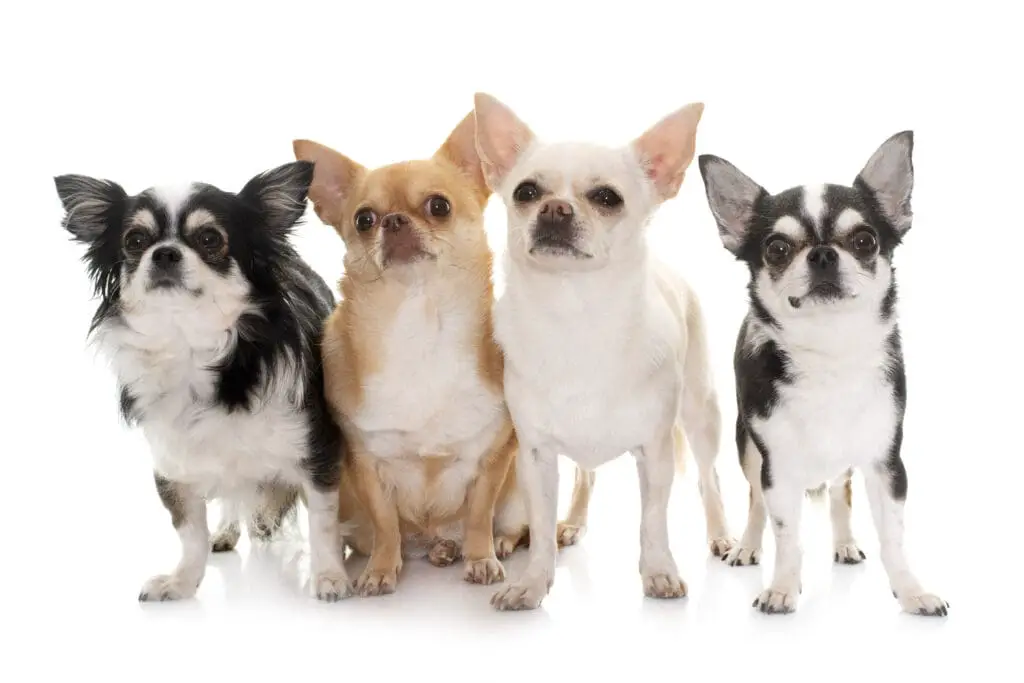
Coat Colors
Chis can have a wide array of coat colors including black, tan, fawn, cream, white, blue, silver, chocolate, and red.
Their coat color may be solid-colored or have two colors combined, creating a diverse and interesting palette within the breed.
Coat Types
The Chihuahua can have either a short or long coat, both of which are recognized under breed standards. Short coats are smooth and close-fitting, while long coated Chis have a fine and fringed appearance.
Life Expectancy
Chihuahuas have a relatively long lifespan compared to other breeds, with an average life expectancy of 12 to 20 years. With your proper care and attention, your Chihuahua should be able to enjoy many happy years as part of your family.
By learning about these physical characteristics, you can better understand and appreciate the uniqueness of Chis.
Whether you’re considering adding one to your family or simply wanting to learn more about the breed, it’s always helpful to know about their appearance and traits.
Temperament & Training of the Chihuahua
Chis are known for their big personalities, packed into a tiny body. Their temperament can be described as feisty, alert, and active.
You’ll find them to be both loving and playful, often with a touch of sassiness.
These little dogs are intelligent, making them generally easy to train.
However, their spirited nature might require you to hold firm in your training techniques.
Consistency is key in ensuring your Chihuahua understands what behaviors are expected from them.
Related Article:
Chiweenie: All the Facts on this Chihuahua Dachshund Mix
Chis have a reputation for being territorial and protective of their owners.
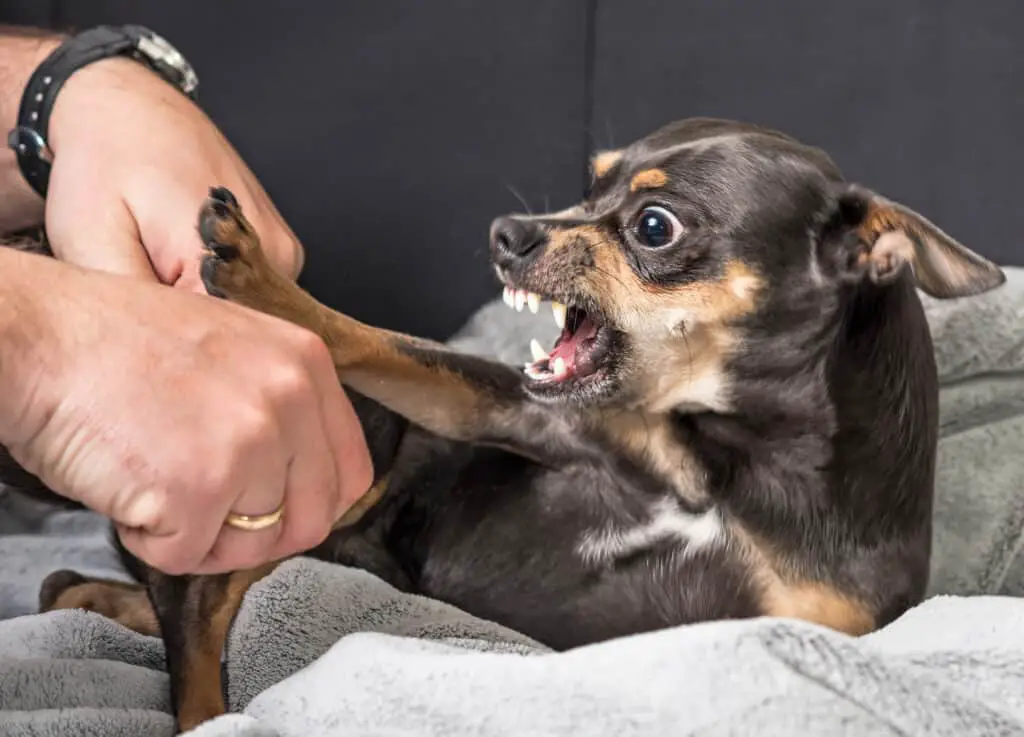
As a result, they may be prone to barking excessively, especially when they feel threatened.
Consequently, it is essential to emphasize early socialization, gradually introducing your Chihuahua to new environments, people, and other animals.
This will help them adapt better to various situations and curb any excessive barking.
To help with trainability, use their high intelligence and fondness for toys to your advantage. Incorporate play into their training sessions to keep them engaged and motivated.
Remember to also provide praise and rewards for good behavior.
Despite their small size, these purse dogs have a surprising high energy level. It is crucial to meet their exercise needs with regular walks and playtime sessions.
Engaging them with puzzle toys and interactive games can also help keep their minds sharp and satisfy their need for mental stimulation.
Unfortunately, one of their negative traits is thinking that they are larger dogs despite their small stature. They may try to go after a bigger dogs at dog parks with deadly results for the Chi.
They are good family dogs but they need extensive and consistent training in order to be around small children. They do better with older children and adults.
In conclusion, training your Chihuahua dog requires patience, consistency, and a little creativity.
With dedication and proper socialization, you can harness their unique temperament and create a loving and obedient companion.
Health Issues of the Chihuahua
Chis, like all dog breeds, are prone to certain health conditions. In this section, you’ll learn about some of the most common health problems that may affect your Chihuahua.
Heart Issues
The leading cause of death for Chis is heart disease.
Heart valve: issues include regurgitation (blood seeping through the heart valves because they do not seal properly), stenosis (the heart valves do not open enough to allow blood to circulate as it should), and valve prolapse (the valve bulges into the upper heart chamber).
Arrhythmia: This is an irregular heartbeat that, in severe cases, can be fatal if the heart’s ability to pump blood is compromised.
Heart failure: Insufficient blood pumping from the heart. As a result, the dog’s body is unable to circulate enough blood and oxygen.
Hydrocephalus
One concerning issue for Chis is hydrocephalus, which is a buildup of fluid in the brain. It can lead to seizures and neurological issues if not treated properly. If you notice your Chihuahua has an unusually large head and exhibits the symptoms mentioned, consult your veterinarian immediately.
Pateller Luxation
Chis are also known for having issues with their knees, such as luxating patella or patellar luxation. This condition occurs when their kneecap dislocates, causing pain and difficulty in walking.
Some signs to look out for include limping or avoiding the use of the affected leg. Regular veterinary check-ups can help diagnose and monitor this issue.
Hypoglycemia
Hypoglycemia, or low blood sugar, is another common health problem faced by Chihuahuas. If your Chihuahua appears dizzy, lethargic, or exhibits tremors, it might be due to hypoglycemia.
Make sure to feed your dog frequent, small meals throughout the day to help manage this issue. If the symptoms become severe, contact your veterinarian right away.
Dental Disease
Dental disease is prevalent among Chis because of their small mouths and overcrowded teeth.
Regular dental care, like tooth brushing and professional cleanings, can help prevent tartar buildup and maintain optimal oral health.
Obesity
Weight gain usually comes from eating too much and not enough daily exercise. Get them the best dog food you can afford and be sure to only give them their daily requirements.
Collapsing Trachea
Another issue that might affect Chis, and is common in small breeds, is a collapsing trachea, which can cause coughing and difficulty breathing.
Your veterinarian may recommend weight management, medication, or even surgery as necessary treatment options.
When it comes to Chihuahua puppies, early preventative care is crucial.
Regular vet visits, vaccinations, and proper nutrition can help your pup avoid many of the aforementioned health issues.
Remember, staying informed and attentive to your Chi’s health can make a significant difference in their well-being. Consult your veterinarian for guidance on the proper care and management of your Chihuahua.
Grooming Your Chihuahua
Brushing
Coat care is essential for your best friend.
Brush your Chihuahua’s coat once a week to maintain its cleanliness and minimize shedding.
A smooth-coated Chihuahua enjoys fewer grooming requirements compared to their long-coated Chis, which may need more frequent brushing to prevent tangles and matting.
Use a natural-bristle brush or a slicker brush depending on your Chi’s coat type to easily remove loose hairs. Don’t forget to brush hard-to-reach spots, such as their lower belly and tail.
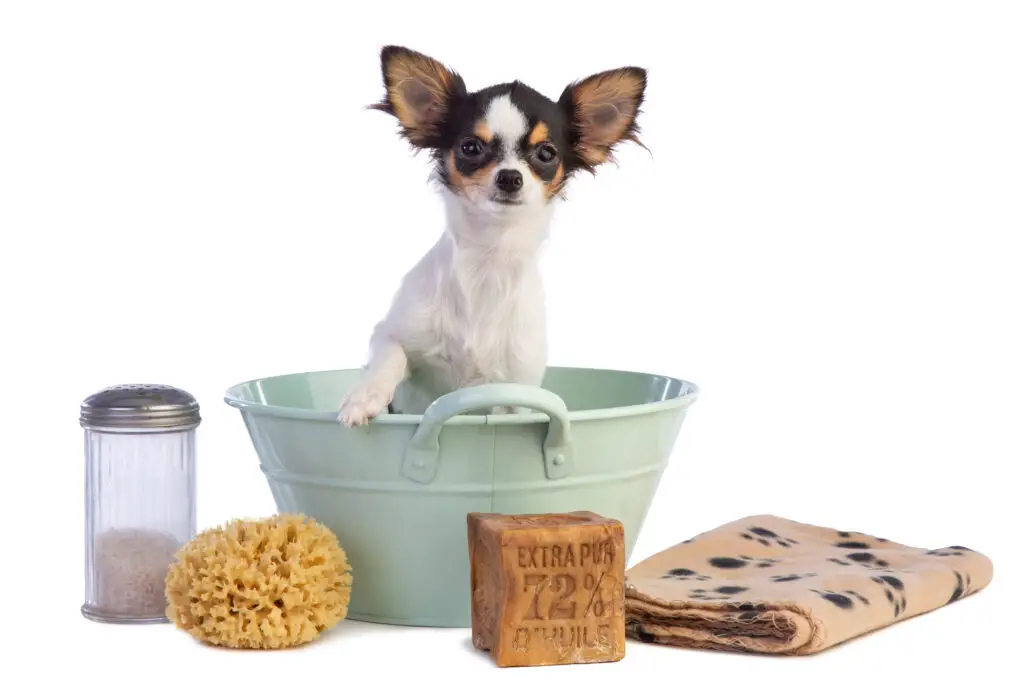
Bathing
Bathing your Chihuahua should be done every 2-4 weeks, or as needed. Use lukewarm water and a dog shampoo suitable for their coat type. We like this Pro Pet Works Oatmeal Shampoo.
Be gentle during the bathing process and avoid getting water in their ears and eyes. This Pet Grooming Bath Massage Brush helps to get down to their skin gently while giving them a massage.
After their bath, use a clean, dry towel to remove moisture from their coat.
Check out our article on the Best Shampoos for Itchy skin if your dog has dry or irritated skin.
Cutting Fur/Hair
While Chis don’t typically require extensive hair trimming, you may occasionally need to trim hairs around their paws, ears, or private areas.
Use dog clippers or grooming scissors for a clean, tidy cut. This GLADOG Professional Grooming Scissors Set is perfect to have on hand. Be cautious when trimming to avoid causing any discomfort or injury.
Clipping or Grinding Nails
Chis, like other dogs, need regular nail maintenance. Check their nails every few weeks and either clip or grind them as necessary.
Be sure to use the proper tools, such as nail clippers or a nail grinder, for a safe and effective trimming experience. Have some styptic powder on hand in case you accidentally cut the quick.
If you are nervous about grinding your dog’s nails, check out our article on how to grind your dog’s nails. And if you are unsure about clipping your dog’s nails check out our article on how to clip your dog’s nails.
Dental Care
Brush your Chi’s teeth at least two to three times a week to prevent dental issues. You can use a dog toothbrush and toothpaste or dental wipes to help clean their teeth.
Provide your Chihuahua with dental chews and toys to ensure further dental care and health.
Cleaning Ears
Regular ear cleaning is crucial for Chis as they are prone to ear infections.
Clean your Chi’s ears with gentle ear cleaning solutions and cotton balls, making sure not to push too deep into the ear canal. Monitor their ears for signs of redness or foul odors, as these may signal an infection or ear mites.
These Pet MD Dog Ear Cleaner wipes are a convenient and easy solution for ear cleaning.
Owning a Chihuahua
Cost of Purchase
When considering owning a Chihuahua, the initial cost of purchase can vary depending on factors like pedigree, age, and breeder reputation.
Typically, Chihuahua puppies range from $500 to $1,500. However, teacup Chihuahuas and those from successful show lines can cost more.
It’s important to be diligent when selecting a breeder and understanding the true value of your investment.
Maintenance Costs
Aside from the initial purchase, Chis have maintenance costs, including food, grooming, and medical expenses.
Their diet and nutrition play a vital role in their overall well-being, so be sure to feed them high-quality food.
Annual costs for their food can range from $200 to $400. Grooming expenses can vary, but Chihuahuas usually require less professional care than other breeds.
One area you should be prepared for is healthcare costs. Chis are prone to certain health issues like dental problems, heart issues, and luxating patellas.
Medical costs for vaccinations, routine vet visits, and preventative care can range from $500 to $1,000 annually, but unforeseen health issues might increase these expenses.
Adopting a Chihuahua
Adopting a Chihuahua from a rescue organization is another option that has several benefits. By giving a loving home to a dog in need, you’re also likely to save on the purchase cost.
Adoption fees usually range from $100 to $300 and often include initial veterinary care, vaccinations, and spaying/neutering.
Be sure to research rescue organizations and select a reputable one to ensure you adopt a healthy Chihuahua.
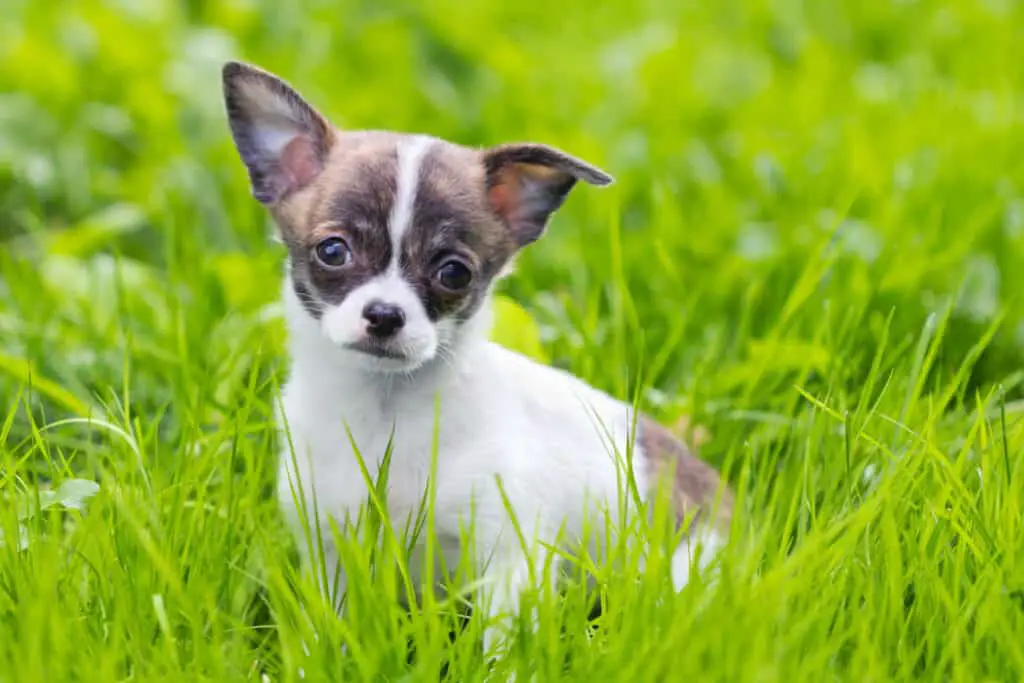
Finding Reputable Breeders
If you decide to purchase a Chihuahua puppy from a breeder, it’s crucial to find a reputable breeder who prioritizes the health and well-being of their dogs.
Some indicators of responsible breeders include:
- Providing a clean and safe environment for the dogs
- Offering a health guarantee
- Prioritizing health testing for the parents
- Socializing the puppies
- Encouraging you to ask questions and meet the parents
Remember, owning a Chihuahua is a commitment that requires time, energy, and financial resources. With proper care and attention, your loyal and affectionate Chihuahua will provide you with years of companionship and joy.
Frequently Asked Questions
What is the typical lifespan of Chihuahuas?
Chihuahuas have a relatively long lifespan compared to other dog breeds. With proper care and attention, you can expect your Chihuahua to live between 12 to 20 years.
Regular veterinary checkups and a balanced diet can significantly contribute to their overall health and longevity.
How can you differentiate between the various types of Chihuahuas?
There are two main types of Chihuahuas: the smooth-coat (short-haired) and the long-coat (long-haired) variety.
Both types can be found in a wide range of colors and patterns. Another distinction can be made between the apple head and deer head Chihuahuas, based on the shape of their skull.
Apple head Chihuahuas typically have a round, dome-shaped head, while deer head Chihuahuas have a more elongated facial structure with a sloping forehead.
What is the average size of a Chihuahua?
Chihuahuas are known to be the smallest dog breed in the world.
Adult Chihuahuas typically weigh between 2 to 6 pounds and stand about 6 to 9 inches tall at the shoulder.
While some Chihuahuas may be smaller or larger than these average measurements, it is essential to ensure they maintain a healthy weight to avoid health issues.
Are Chihuahuas considered a friendly breed suitable for families?
Chihuahuas can be loving and affectionate pets, but they are not always the perfect choice for families with young children.
Due to their small size, they may be easily injured or frightened by rough play.
Additionally, Chihuahuas tend to bond strongly with one person and can be cautious or territorial around strangers or other pets.
However, early socialization and proper training can help improve their temperament and adaptability to various environments.
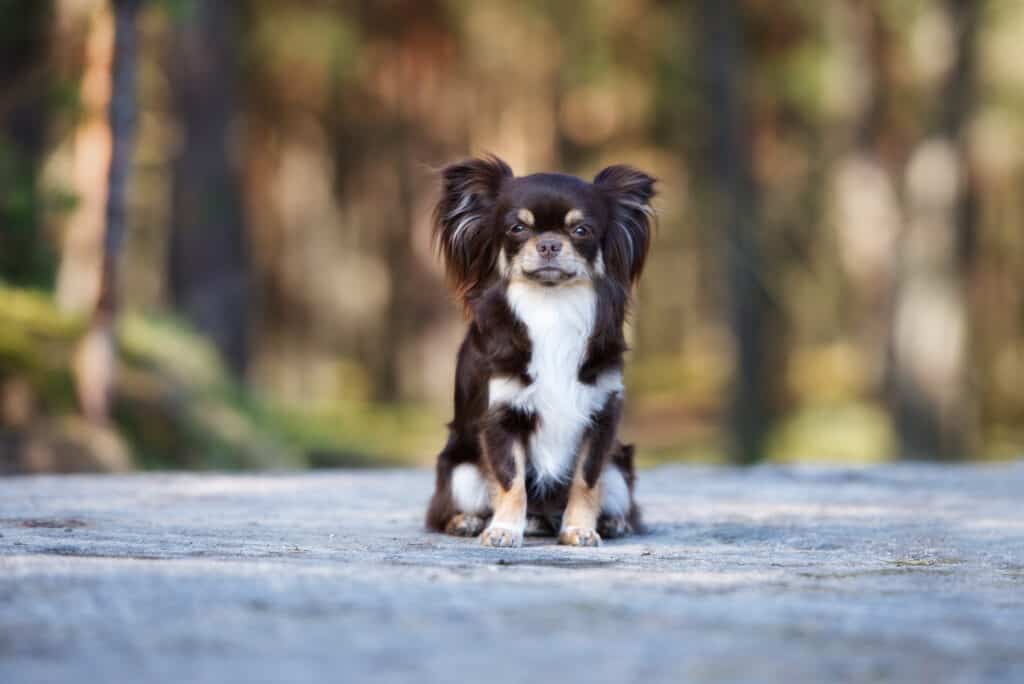
How much grooming does a long-haired Chihuahua require?
Long-haired Chihuahuas require more grooming than their smooth-coat counterparts. You should brush your long-haired Chihuahua’s coat at least once or twice a week to prevent tangles and matting.
Regular bathing, every 4 to 8 weeks, can help maintain a clean and healthy coat.
Don’t forget to check their ears and trim their nails regularly as part of their grooming routine.
What are the common personality traits of Chihuahuas, such as their vocal behavior and attachment to owners?
Chihuahuas are known for their loyalty and strong attachment to their owners.
This breed can form close bonds with their human companions and may be protective or territorial around them.
Chihuahuas are also known to be quite vocal and may bark or whine to communicate their emotions or alert you to potential dangers.
They recognize their owners and tend to be intelligent and responsive to training when using positive reinforcement techniques.
Conclusion: Bottom Line on the Chihuahua

Chihuahuas are a breed of tiny, yet fearless dogs that can bring joy and companionship into your life. They are known for their loyalty and affection, making them ideal pets for those seeking a close bond with their furry friends.
When it comes to choosing between male and female Chihuahuas, there are no definitive answers, as preferences often vary based on personal experiences.
Ultimately, it’s about finding the right connection with your potential pet, regardless of its gender.
One aspect to consider is that Chihuahuas, being small dogs, are more prone to injury and require extra care.
You should always provide supervision when they interact with larger animals, small children or adventurous environments.
Despite their small size, Chihuahuas require sufficient socialization and exercise to maintain their health and temperament.
Here are some key points to remember about Chihuahuas:
- Affectionate: Chihuahuas form strong connections with their owners, making them a loving companion.
- Exercise: Provide daily walks and playtime to keep their energy levels balanced.
- Monitoring: Keep an eye on your Chihuahua to prevent injuries or confrontations with larger animals.
- Socialization: Expose your Chihuahua to diverse environments and other pets for a well-rounded temperament.
- Training: Utilize appropriate techniques to instill desirable behavior in your Chihuahua. Keep in mind, they may come off as less intelligent compared to other breeds, but with the right approach, they can be trained effectively.
As a potential Chihuahua owner, you should be prepared to invest time and effort into your pet’s well-being, including affection, supervision, exercise, and more.
Ultimately, if you are willing to provide the proper care and attention a Chihuahua needs, you’ll be rewarded with a lovable and loyal companion.
Please read our Legal Disclaimer

